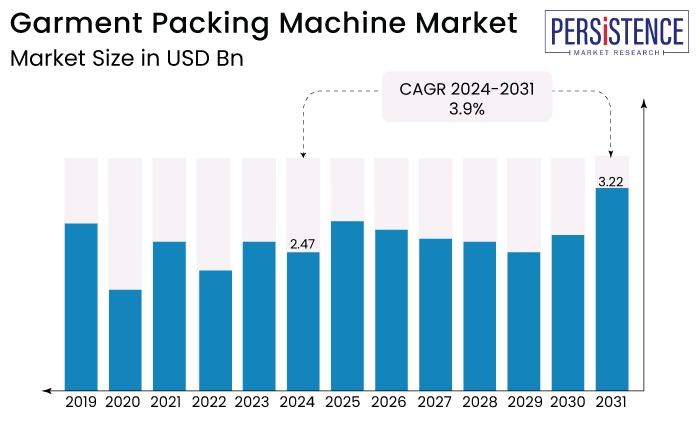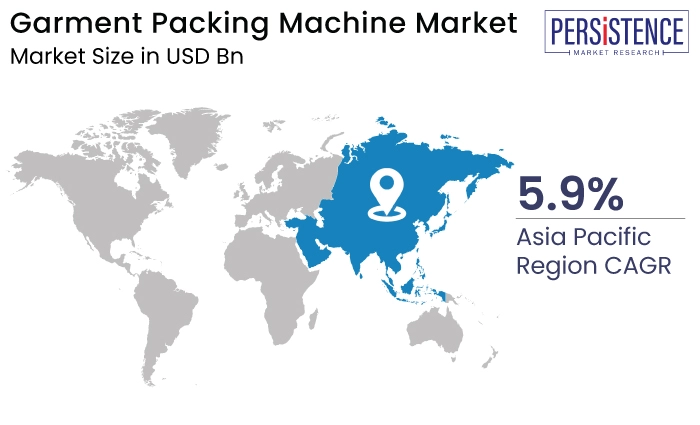Industry: Industrial Automation
Published Date: August-2024
Format: PPT*, PDF, EXCEL
Delivery Timelines: Contact Sales
Number of Pages: 219
Report ID: PMRREP34614
The global market size is estimated to worth at US$3.29 Bn by the end of 2031 from US$2.47 Bn estimated in 2024. The market forecast is expected to exhibit a CAGR of 3.9% in the forthcoming years from 2024 to 2031.
Key Highlights of the Market
|
Market Attributes |
Key Insights |
|
Garment Packing Machine Market Size (2024E) |
US$2.47 Bn |
|
Projected Market Value (2031F) |
US$3.22 Bn |
|
Forecast Growth Rate (CAGR 2024 to 2031) |
3.9% |
|
Historical Growth Rate (CAGR 2019 to 2024) |
2.1% |
The global garment packing machine market is experiencing a moderate growth, driven by increasing demand for efficient packaging solutions in the textile and apparel industry, aimed at enhancing product protection, branding, and shelf appeal.
Leading global players are heavily investing in R&D to introduce advanced packaging technologies that offer durability, aesthetics, and functionality, thus boosting competitiveness.
The rise of e-commerce, particularly in developing markets like India, and China, has further propelled the industry, necessitating robust packaging solutions to ensure safe transport and delivery of garments.
Automation and technological advancements in packaging machinery are revolutionizing production rates, efficiency, and customization capabilities, enabling businesses to meet the escalating demand for sophisticated and visually appealing packaging solutions that enhance consumer satisfaction and brand loyalty.
The rise of compact and versatile packing machines tailored for small enterprises marks an important trend among smaller businesses with limited space and budget constraints as they seek flexibility, affordability, and ease of operation.
By enabling small enterprises to efficiently meet packaging requirements without significant capital investment, these machines empower them to compete effectively in the market.
Innovations like re-sealable bags, and stretch films enhance product protection and user experience, reflecting an industry response to evolving consumer preferences in the garment sector.

The market navigated through fluctuations driven by evolving consumer preferences for durable packaging in the textile industry and varying economic conditions.
The COVID-19 pandemic in 2020 severely disrupted the industry, causing a sharp decline in apparel consumption globally due to lockdowns and economic uncertainty. This downturn challenged the market's stability.
Despite the obstacles, the sector maintained a modest CAGR of 2.1% from 2018 to 2024, reflecting its resilience and gradual recovery as restrictions eased and economic activities resumed, signalling renewed growth potential in the post-pandemic era.
The market, valued at US$2.4 Bn in 2024, is projected to grow at a CAGR of 3.9% through 2031, with an absolute dollar opportunity of US$758.8 Mn.
The garment packing machine market is on a growth trajectory driven by rising disposable incomes, improved supply chain efficiencies, and the rapid expansion of e-commerce worldwide.
The market growth is further fueled by increasing automation in packaging, which enhances efficiency and meets the demands for speed and customization in the garment industry and beyond.
As economies reopen and e-commerce continues to flourish, the market for advanced packaging solutions is expanding robustly, attracting investments and facilitating enhanced operational capabilities across various industries.
Rising Demand for Smart and Flexible Packaging Solutions
The market expansion is experiencing robust pace due to the increasing emphasis on operational efficiency and cost reduction in industries worldwide.
Companies are adopting machines which can perform smart and flexible garment packing process to automate the packaging. It is driven by the promise of enhanced productivity and substantial cost savings.
Continuous innovations, including robotics and artificial intelligence integration, are revolutionizing these machines, enabling them to handle complex tasks efficiently.
These packing machines ensure consistent packaging quality, minimizing errors and reducing labor costs associated with manual packing. This shift towards automation not only enhances brand reputation and customer satisfaction but also aligns with sustainability goals by reducing reliance on manual labour and offering eco-friendly packaging solutions.
Exploding E-commerce Expansion
The expanding e-commerce sector is a key driver propelling the market forward. With the rapid expansion of online retail platforms, there is a corresponding surge in orders necessitating efficient packaging solutions.
Garment packing machines are increasingly sought after to meet the demands of high order volumes, ensuring swift and accurate packaging processes to keep pace with e-commerce demands.
Moreover, as environmental concerns gain prominence, there is a growing preference for eco-friendly packaging solutions. This shift is further fueling the demand for machines capable of utilizing sustainable materials and minimizing waste.
Consequently, the e-commerce boom not only drives the need for efficient packaging machinery but also catalyses innovation towards more sustainable packaging practices within the market.
High capital costs prevent small investors from the market
The garment packing machine market poses a significant challenge for small and medium-sized enterprises (SMEs) due to the substantial initial investment required for automation.
SMEs often lack the financial resources needed to procure and install these advanced machines, limiting their ability to compete with larger industry players.
Economic uncertainties within the protective packaging sector, influenced by factors such as income levels and employment rates, further compound the challenges for SMEs.
Fluctuations in consumer demand and shipping volumes can impact the feasibility of investing in automated garment packing solutions.
Additionally, stringent packaging regulations, particularly those emphasizing environmental sustainability, impose additional costs and complexities for SMEs, constraining their adoption of automated packaging technologies. Overcoming these barriers is crucial to enabling SME participation and fostering innovation and growth within the market.
Gowing Inclination Towards Eco-Friendly Packaging Solutions
The rising demand for eco-friendly packaging solutions is reshaping the industry. Garment packing machines capable of utilizing sustainable materials and minimizing waste are gaining significant traction. This shift reflects a broader societal consciousness towards environmental sustainability.
By aligning with this trend, packing machine manufacturers not only meet consumer preferences but also contribute to a greener future. Embracing these opportunities presents a pathway for businesses to thrive while championing ecological responsibility, forging a mutual relationship between industry innovation and environmental stewardship.
The integration of robotics and artificial intelligence have sparked a transformative wave, enhancing the capabilities and efficiency of these machines. These advancements not only streamline packing processes but also elevate productivity to unprecedented levels.
As businesses seek to optimize their operations, they increasingly turn to these cutting-edge solutions to stay competitive in an evolving market landscape.
|
Machine Type |
Projected CAGR through 2031 |
|
Standalone Systems |
5.1% |
Standalone Systems Spearhead the End User Preferences
In the garment packing machine market, standalone systems hold a major share of 41%. It represents a crucial segment characterized by individual machines designed to perform specific packaging tasks independently.
Standalone machines include case packers, over-wrappers, cartoners, soft-packers, and labelling machines. Standalone systems offer versatility and flexibility, allowing businesses to address various packaging needs with specialized equipment.
Standalone systems are preferred due to their modular nature, enabling easy integration into existing production lines or operations, which facilitates seamless upgrades or modification without disrupting the entire packaging process.
Standalone systems are thus ideal for businesses aiming to scale operations gradually or adapt to evolving market demands.
Furthermore, standalone systems provide manufacturers with the freedom to tailor their packaging processes to specific product requirements or production volumes, offering efficient solutions for streamline packaging and enhancing productivity.
End User-wise Analysis
|
End User |
Projected CAGR through 2031 |
|
Textile Sector |
4.7 % |
Textile Industry Accounts for 37% of Machine Sales
The textile sector dominates the garment packing machine market with the share of 37%. With the textile industry’s complex and diverse packaging requirements, machines that are tailored to meet these specific needs are in high demand.
Garment packing machines play a pivotal role for the textile industry as they ensure the efficiency and precision in packaging of various textile products, including apparel, fabrics, and accessories.
The textile industry's growing focus on sustainability is driving demand for machines that offer eco-friendly packaging solutions. As textile companies aim to lessen their environmental impact, they seek packaging technologies utilizing sustainable materials and reducing waste.
machines with eco-friendly features not only support the industry's sustainability objectives but also appeal to environmentally conscious consumers.
|
Region |
CAGR through 2034 |
|
North America |
3.8 % |
|
Asia Pacific |
5.9 % |
North America's Dominance Prevails in Garment Packing Machine Market
North America's market for garment packing machines stands out for its robust demand and technological sophistication. The US especially showcases a promising market for garment packaging machines, projected to grow at a steady rate of 3.8% through 2031.
With a mature industrial landscape and a focus on automation, the region commands a significant share in garment packaging machinery.
Major retail players, including e-commerce, drive the consumer demand, necessitating secure and visually appealing packaging solutions. To meet these demands, US companies leverage sophisticated garment-packing machines equipped with automation, and AI-driven systems.
Moreover, North America's inclination towards innovation drives the adoption of cutting-edge technologies in garment packing machinery. Manufacturers continually strive to enhance efficiency and capabilities, setting global industry standards.
As e-commerce flourishes and consumer preferences evolve, the North American segment of the market remains dynamic, promising further growth and advancements.
Asia Pacific Emerges Lucrative with a Flourishing Garment Sector
The garment packing machine market in the Asia Pacific region is thriving with the CAGR of 5.9% for the forecast period, propelled by robust growth rates in key countries like India, and China.
India, and China are rapidly expanding their packaging industry, adopting advanced packaging solutions to meet the growing demands of their burgeoning garment sectors.
With China's vast market size and increasing industrial capabilities complementing India's robust adoption of these technologies, both countries are significant drivers of global clothing and apparel demand.
The trend underscores the crucial role of efficient packaging technologies in supporting their respective garment industries amidst their substantial populations.
Garment companies in Asia are embracing advanced packaging solutions to safeguard products during transit and elevate the consumer unboxing experience.
The shift towards automated garment packing machines is reshaping operations, enhancing efficiency, and minimizing packaging waste. By adopting these technologies at scale, companies are bolstering their competitiveness and meeting heightened standards for packaging quality in global and domestic markets.

The industry players are prioritizing growth through strategic acquisitions and partnerships, with a strong focus on evolving in the market as well as developing eco-friendly approach in the packaging. Their strategies to grow in the market is driving the expansion of the textile industry in various region.
The introduction of the clothing industry in the packaging machine manufacturing industries is leading the market to grow more. The strategic way of new companies to make a move by introducing eco-friendly packing is attracting the other industry players.
Harry Rosen Inc., a Canadian retail chain of 17 luxury men’s clothing stores, launched a garment bag recycling program with TerraCycle in February 2024, demonstrating their dedication to sustainability initiatives.
July 2023
Nexgen Packaging, and ARISE IIP teamed up to advance the African textile and apparel industry. This partnership is intending to focus on growing the textile industry in Africa.
|
Attributes |
Details |
|
Forecast Period |
2024 to 2031 |
|
Historical Data Available for |
2018 to 2023 |
|
Market Analysis |
US$ Billion for Value |
|
Key Regions Covered |
|
|
Key Market Segments Covered |
|
|
Key Companies Profiled in the Report |
|
|
Report Coverage |
|
|
Customization & Pricing |
Available upon request |
By Machine Type
By End User
By Region
To know more about delivery timeline for this report Contact Sales

The market is roughly valued at US$2.4 billion as of 2024.
The market is expected to grow with forecast CAGR of 3.9% during 2024 to 2031.
The market will reach US$3.2 billion by the end of 2031.
KETE Group Ltd, PAC Machinery Group, KHS, and U-Packaging Machinery are some of the top players in the market.
Textile is the fastest growing end user segment in the market.